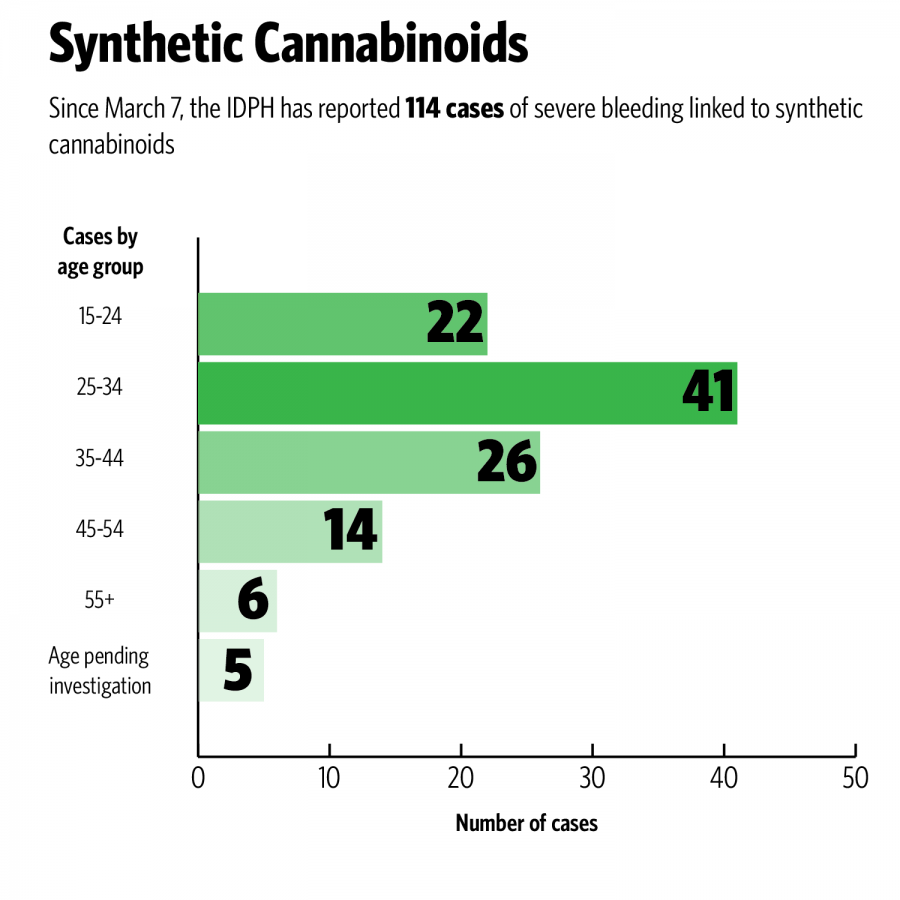Statewide public health outbreak linked to synthetic cannabinoids
April 12, 2018
Over 100 individuals across the state have reported severe bleeding after using synthetic cannabinoids, and the Champaign-Urbana Public Health District is trying to prevent it from spreading to the area.
Monday, the Illinois Department of Public Health reported the third death, and there have been 114 reported cases of severe bleeding after using synthetic cannabinoids as of Tuesday.
Synthetic cannabinoids are man-made chemicals with mind-altering effects that are sprayed onto dried plant materials, said Julie Pryde, public health administrator for the CUPHD. These chemicals mimic the effect of THC, the primary psychoactive ingredient in marijuana.
Synthetic cannabinoids can be smoked or vaporized in e-cigarettes, Pryde said, and have brand names such as K2, Black Mamba and Genie.
Pryde said sick individuals used a particular synthetic cannabinoid containing brodifacoum, a lethal anticoagulant commonly found in rat poison.
Get The Daily Illini in your inbox!
According to the IDPH website, people who have gotten sick from the synthetic cannabinoids “have reported coughing up blood, blood in the urine, severe bloody nose, bleeding gums and/or internal bleeding.”
“So far, there have been no cases in Champaign,” Pryde said. “We feel like, hopefully, we’ve gotten ahead of this a little bit.”
Last week, Pryde and members of the health district went to convenience stores and gas stations in the area to see if any were selling the harmful products.
“We found no cases of it being sold anywhere,” Pryde said. “Everyone we talked to at the shops was super cooperative, and we were able to post flyers and provide information.”
Pryde said the department has been doing a lot to spread word about synthetic cannabinoids. She hopes their efforts have been enough to deter the outbreak.
According to IDPH’s website, most cases have been concentrated in Chicago and the Peoria and Tazewell counties, but there have been a sprinkle of cases in other counties in central Illinois.
Many of the sick individuals reported acquiring the synthetic cannabinoid products from convenience stores, dealers or friends in the Chicagoland area, but contaminated products could also be in other counties in the state.
Synthetic cannabinoids are hard to regulate because their chemical formulas are constantly changing, allowing them to avoid government bans, Pryde said.
“These products are infused with chemicals, and the consumer rarely knows exactly what chemicals they contain, how much and how your body is going to react,” said Lt. Joseph McCullough of the University of Illinois Police Department.
Around 19 percent of reported severe bleeding cases linked to synthetic cannabinoids have of been individuals between 15 and 24 years old, around the age of college students.
“Although the substances have been made illegal in our state, they are still available in various forms at some convenience stores and online – I cannot stress enough that this does not make it safe,” McCullough said.
McCullough said the use of the drugs on college campuses has decreased.They do not see it used as often as other illicit drugs, but some students still use the chemicals.
“While efforts are underway to get the contaminated drugs out of circulation, it’s possible they could re-emerge. We urge people not to use synthetic cannabinoids now or ever,” said Nirav Shah, IDPH director, in a press release.







